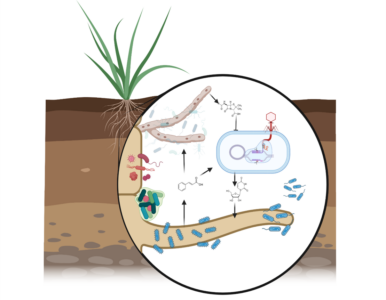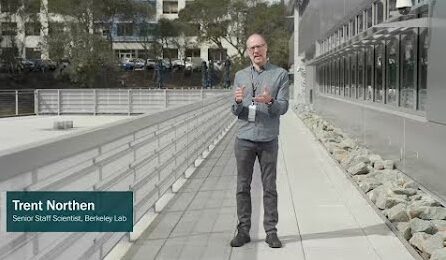Science Focus Area: Lawrence Berkeley National Laboratory
- Principal Investigator: Trent R. Northen1
- Technical Co-Manager: Adam M. Deutschbauer1
- Co-Investigators: Jillian F. Banfield2, Rodolphe Barrangou3, Romy Chakraborty1, Jennifer A. Doudna2, N. Louise Glass2, Vayu Hill-Maini4, Jenny C. Mortimer1,5, Aindrila Mukhopadhyay1, Daniel Segrè6, Anup K. Singh7, John Vogel1, Kateryna Zhalnina1
- Participating Institutions: 1Lawrence Berkeley National Laboratory, 2University of California–Berkeley, 3North Carolina State University, 4Stanford University, 5University of Adelaide, 6Boston University, 7Lawrence Livermore National Laboratory
- Project Website: mcafes.lbl.gov
- Related Website: fabricatedecosystems.lbl.gov

m-CAFES. The m-CAFEs SFA, led by Lawrence Berkeley National Laboratory (LBNL), is developing and deploying unique laboratory capabilities that capture key aspects of grass rhizosphere communities and identify the causal mechanisms that govern microbial interactions within the rhizosphere. Computational modeling is used to predict interactions and responses that are then tested experimentally and refined until they accurately predict field processes. [Courtesy LBNL]
Summary
Microbial Community Analysis and Functional Evaluation in Soils (m-CAFEs) is a multi-institutional Science Focus Area program aimed at understanding the interactions, localization, and dynamics of grass rhizosphere microbial communities at the molecular level (genes, proteins, metabolites) to accurately predict responses to perturbations and ultimately harness microbes to achieve Department of Energy missions in sustainable energy and carbon cycling. Advanced fabricated ecosystems are used in combination with gene editing technologies such as CRISPR-Cas and bacterial virus (phage)-based approaches for interrogating gene and microbial functions in situ, thereby addressing key challenges highlighted in recent Department of Energy reports. This work is integrated with the development of predictive computational models that are iteratively refined through simulation and experimentation. Simplified microbial consortia assembled in the laboratory are used in combination with soil-derived microbial communities to gain critical insights into the biology and ecology of engineered genes and microbes within soils. This SFA is pioneering the use of meter-scale contained and controlled ecosystems to enable the extension of m-CAFEs approaches and science to more complex environments. Our research on microbial communities leverages the team’s extensive expertise in CRISPR-Cas systems, phage biology, genome-resolved metagenomics, high-throughput bacterial and fungal genetics, and multi-omics, as well as our plant mutant collections and phenotyping capabilities. Together, these efforts lay a critical foundation for developing biosystem design strategies, harnessing beneficial microbiomes to support sustainable bioenergy, and improving our understanding of nutrient utilization and cycling in the rhizosphere. The knowledge gained and approaches pioneered by m-CAFEs can be extended to other ecosystems and will advance microbiome research towards a more predictive and causative science.

